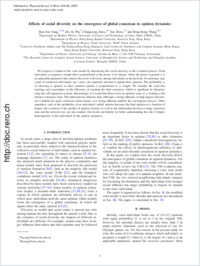Effects of social diversity on the emergence of global consensus in opinion dynamics
- Yang, Han-Xin Department of Modern Physics, University of Science and Technology of China, Hefei, China - Department of Physics, Hong Kong Baptist University, Kowloon Tong, Hong Kong
- Wu, Zhi-Xi Department of Physics, Umeå University, Sweden
- Zhou, Changsong Department of Physics, Hong Kong Baptist University, Kowloon Tong, Hong Kong - Centre for Nonlinear Studies and The Beijing-Hong Kong-Singapore Joint Centre for Nonlinear and Complex Systems (Hong Kong), Hong Kong Baptist University, Kowloon Tong, Hong Kong
- Zhou, Tao Department of Modern Physics, University of Science and Technology of China, Hefei, China - Department of Physics, University of Fribourg, Switzerland
- Wang, Bing-Hong Department of Modern Physics, University of Science and Technology of China, Hefei, China - The Research Center for Complex System Science, University of Shanghai for Science and Technology and Shanghai Academy of System Science, China
-
14.10.2009
Published in:
- Physical Review E. - 2009, vol. 80, no. 4, p. 046108
English
We propose a variant of the voter model by introducing the social diversity in the evolution process. Each individual is assigned a weight that is proportional to the power of its degree, where the power exponent α is an adjustable parameter that controls the level of diversity among individuals in the network. At each time step, a pair of connected individuals, say i and j, are randomly selected to update their opinions. The probability pi of choosing is opinion as their common opinion is proportional to is weight. We consider the scale-free topology and concentrate on the efficiency of reaching the final consensus, which is significant in characterizing the self-organized systems. Interestingly, it is found that there exists an optimal value of α, leading to the shortest consensus time. This phenomenon indicates that, although a strong influence of high-degree individuals is helpful for quick consensus achievement, over strong influence inhibits the convergence process. Other quantities, such as the probability of an individual's initial opinion becomes the final opinion as a function of degree, the evolution of the number of opinion clusters, as well as the relationship between average consensus time and the network size, are also studied. Our results are helpful for better understanding the role of degree heterogeneity of the individuals in the opinion dynamics.
- Faculty
- Faculté des sciences et de médecine
- Department
- Département de Physique
- Language
-
- English
- Classification
- Physics
- License
-
License undefined
- Identifiers
-
- RERO DOC 13214
- DOI 10.1103/PhysRevE.80.046108
- Persistent URL
- https://folia.unifr.ch/unifr/documents/301352
Statistics
Document views: 192
File downloads:
- pdf: 260
